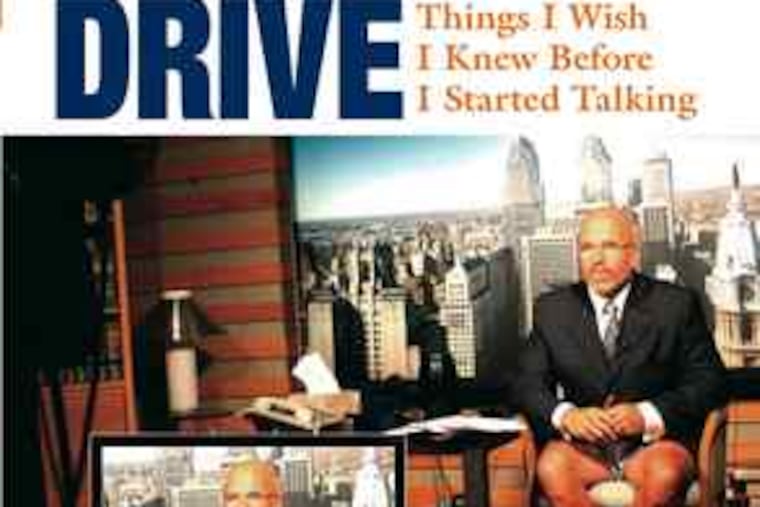An inside scoop on talk radio
Smerconish's fast-paced narrative showcases his personal story and his political savvy.

Morning Drive
nolead ends nolead begins Things I Wish I Knew
Before I Started Talking
nolead ends nolead begins By Michael A. Smerconish
Lyons Press. 300 pp. $24.95
nolead ends nolead begins
Reviewed by David W. Marston
In 1987, Michael Smerconish was a senior adviser in the campaign of legendary nightstick-in-the-cummerbund Mayor Frank Rizzo (as a sixth grader, Smerconish had made Rizzo his pen pal, and they remained "very close friends" until Rizzo died).
By 2008, lifelong Republican Smerconish, by then a top Philly radio host, very publicly announced his support for Democrat Barack Obama for president.
This stunning political sea change captures Smerconish. Friends stay friends, but he is dependably unpredictable, his political views are constantly evolving, and he does not duck white-hot controversy.
Example: When they were renaming streets and bestowing honorary citizenship across Europe to honor international "martyr" Mumia Abu-Jamal, Smerconish coauthored Murdered by Mumia, a book aimed at keeping cop-killer Abu-Jamal behind bars and the memory of his victim, Officer Daniel Faulkner, alive. (Proceeds from the book go to a nonprofit that benefits children of Philadelphia murder victims.)
And while Smerconish is - or at least was, until his Obama vote - a GOP politico down to his toenails, he is also breezily indifferent to the dictates of Republican Party dogma.
Making the most of his unconventional views, Philadelphia lawyer Smerconish (who also writes a column for The Inquirer) has morphed into a nationally syndicated, outside-the-box radio host. His new book, Morning Drive, delivers his unique vision of down-decibel talk radio that does not echo Rush Limbaugh or Glenn Beck; indeed, Smerconish identifies the late Meet the Press host Tim Russert as a role model "before anyone on radio."
Rather than hosting hard-edged political combat, Smerconish has an ambition to offer up a radio version of Seinfeld (" . . . a show about nothing, it was really a show about everything."). Front-page news and critical issues are in his mix, but Smerconish contends that "the best radio is when I find those rich somethings in nothing," the quirks and foibles of daily life that have universal resonance. (That's what he wishes he knew before he started talking.)
Part dishy autobiography, part savvy political insight and war stories, Morning Drive is a fast-paced journey across wildly varied terrain, from the smoky backrooms of Philly ward politics to the United States Central Command base in sweltering Qatar, the nerve center for U.S. military efforts in the Middle East.
Smerconish describes radio highs and embarrassing gaffes ("I Say 'Stupid' Things Every Day" is one chapter title), and his passionate interest in myriad subjects - politics, books and his cherished book club, sports, rock concerts, cigars, dogs, the list goes on - is central to the success of both his radio show and this book about it.
Morning Drive also tracks the author's relentless rise from occasional radio guest to fill-in host, to having his own morning-drive show. Some career breaks seem lucky, but Smerconish excels at making his own luck. Renowned TV newsman Larry Kane could help him land several jobs because Smerconish, on a summer job delivering chlorine for Kane's pool, insisted that Kane had to personally "sign for" the chlorine, brashly introduced himself - and stayed in touch.
When an early station declined to advertise Smerconish's show, he bought a big billboard in Manayunk for $3,000 and advertised himself ("He'll Make You Mad").
While Morning Drive is mostly a spicy smorgasbord of political vignettes and inside-radio insights, Smerconish also serves up a little spinach, in the form of what he calls his Suburban Manifesto.
Conducting a "personal political sanity check" to see if the Republican Party still best reflects his views, he devotes a short chapter to each of 15 political issues, in which he outlines his views (e.g., against campaign-finance laws, for term limits, for terrorist profiling and even torture if necessary, cautiously uncertain on global warming) and his reasons for them.
He concludes that "there are many of us who want a party that's tough on the bad guys, not too preachy, doesn't piss away money, and is no longer willing to allow fringe elements to take over its platform."
Arguing that any winning national party must be able to win the suburbs, Smerconish's political analysis is pragmatic and smart, and the reader may be a better person for having worked through these issues. Still, it tastes a little like spinach.
But that's a quibble. Morning Drive succeeds impressively in its stated goal: presenting Smerconish's political outlook "wrapped in a talk-radio memoir and behind-the-scenes look at the modern world of political punditry." That world includes a national producer who invited Smerconish to appear on TV only if he was willing to say that Obama's cockiness will hurt him. Another TV invitation depended on Smerconish's calling Hillary Rodham Clinton a liar. He declined both invitations. With bombshells like that, this highly readable account could match the impact of a book by another Philly media guy: Joe McGinniss' The Selling of the President 1968.
Smerconish may make you mad, as his billboard promised, but Morning Drive will also make you laugh, and think, and ultimately more fully enjoy the capricious game of American politics.